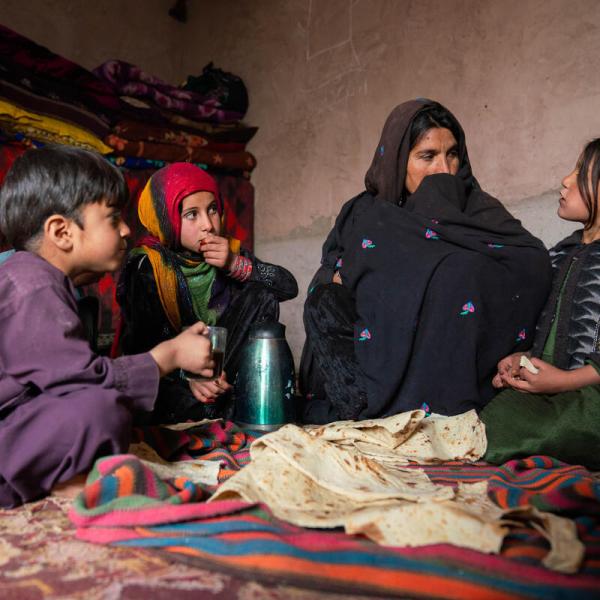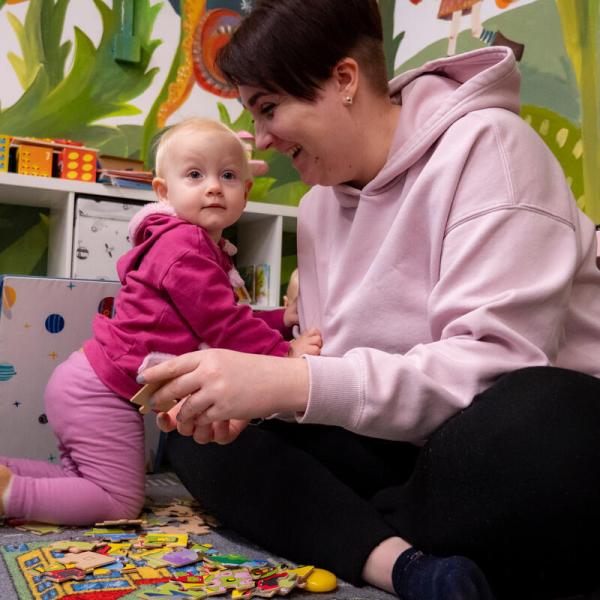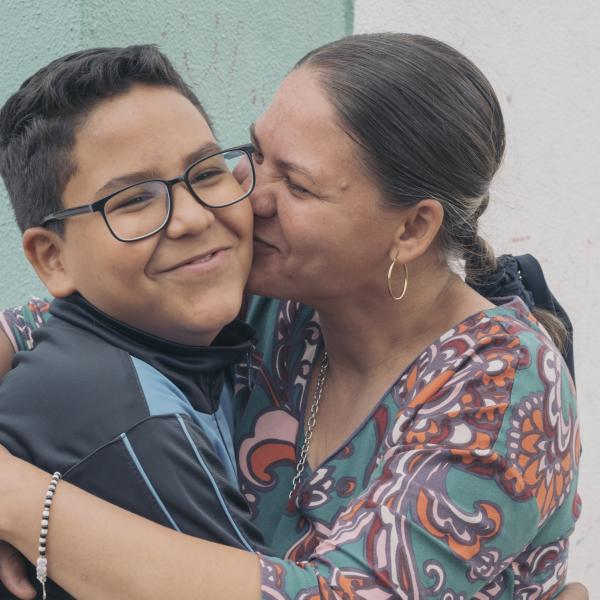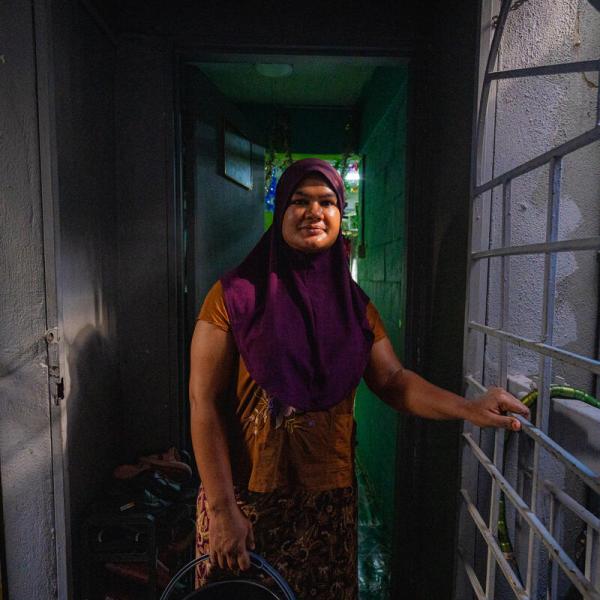Everywhere around the globe, mothers are too often the unsung heroes of their communities. Even while caring for their children and families, they wear many hats – doctors, cooks, engineers, and more – ensuring a livelihood for their households. They are the pillars of their communities, drivers of peace, and catalysts for change. Mothers who are displaced are no exception.
On this Mother’s Day, let’s honour their courage, resilience, and strength.

Building peace, brick by brick in the Central African Republic
After being forced to flee her hometown of Baoro in the Central African Republic in 2014, Francine found safety in Bouar, the capital of Nana-Mambéré prefecture. Five long years later, she was finally able to return, only to find that her livelihood and home had been destroyed. Farming to survive and support her five children, Francine never gave up or lost hope for a better future.
Today, she is rebuilding that future: one brick at a time. Through a development project funded by UNHCR, Francine has become a trained mason. From rehabilitating public infrastructure damaged by conflict to building sustainable shelters for internally displaced people and returnees, she is helping rebuild her hometown into a safe haven for her children.
“I help with masonry. I also transport fired bricks for construction. Every day, we start at 8 a.m. It’s an opportunity for me to meet my family’s essential needs,” she says.
Francine is also mobilizing other women to gain financial independence and contribute to peace in Baoro.
“Let’s all come together to support the project and offer a better future to our children,” she concludes.
Today, 680,000 refugees from the Central African Republic remain displaced in neighbouring countries, and over 440,000 are displaced within the country.

Raising hope in Afghanistan amidst adversity
Having endured unimaginable hardships, Akhtar is a testament to the resilience of mothers and the lengths they will go to provide for their children. Originally from Faryab province in Afghanistan, near the border with Turkmenistan, Akhtar and her family have been displaced multiple times. Now living in Herat for seven years, they face extreme hardship.
As the only adult in the household, Akhtar must rely solely on herself to care for her two daughters and a son who lives with palsy. For years, she has faced each day with courage, doing everything she can to keep her children alive and hopeful.
UNHCR supports families like Akhtar’s, who face compounded challenges from poverty and displacement.
Over 5 million Afghan refugees live in neighbouring countries, mainly in Iran and Pakistan. Another 3.2 million are displaced within Afghanistan.

Escaping war to protect her baby: a Ukrainian mother’s journey
After giving birth to her daughter Kira, Veronika could not bear the idea of raising a child in a warzone. The 24-year-old mother from the Dnipropetrovsk region of Ukraine took it upon herself to seek safety – even without help from her family.
“Kira was four-and-a-half months old then. I put her in a sling and carried her all across Ukraine, by bus and train. Baby, pushchair, rucksack, I was loaded down with luggage.” she recalls.
Now living in Budapest, Veronika receives support from a centre for single mothers with young children. Beyond the essentials, it’s the community – the ability to speak with other mothers and share stories – that she values most.
More than 6.9 million people fled Ukraine following the 2022 full-scale invasion. Hungary and neighbouring countries continue to host many, while 4 million remain displaced within Ukraine.

From fear to the classroom: one mother’s journey from Venezuela to Ecuador
Facing rising violence in Venezuela, Ilzaoli had no choice but to flee with her child, Gabriel, in search of a safer future. After days of walking, they reached Otavalo, Ecuador. Exhausted and hungry, Ilzaoli was overjoyed simply to enroll Gabriel in school, being able to give him a safe space, friends, and a future free from fear.
“At the beginning Gabriel did not speak much. In Venezuela, we always had to keep our children isolated due to violence and insecurity, so here they were afraid of talking, of going out. Now they chat with friends and have integrated.”
Ecuador hosts one of Latin America’s largest refugee populations, with over half a million Venezuelan refugees and migrants. Around 40% are children, making access to education essential to their integration and protection.

More than a mother: leading and lifting others in Malaysia
Fatimah is a mother to more than just her six-year-old son. A decade ago, she fled Myanmar to find safety in Malaysia. There, she took in Halidah, a young Rohingya girl separated from her family, becoming her foster mother.
Now sharing a modest apartment on the outskirts of Kuala Lumpur, Fatimah juggles caregiving, household chores, and multiple jobs. Yet she still finds time to support others in her community. As a volunteer, she helps fellow refugees with translation, hospital visits, and documents, often responding to calls for help via a Rohingya WhatsApp group.
1.4 million people – mostly Rohingya – have fled Myanmar. Close to a million are in Bangladesh’s Cox’s Bazar, one of the world’s largest refugee camps. Over 150,000 have sought safety in Malaysia, while an estimated 3.5 million remain displaced inside the country.
Support refugee mothers
Stories like those of Francine, Akhtar, Veronika, Ilzaoli, and Fatimah represent just a few among millions of courageous refugee mothers. While today is a day to celebrate their strength, love, and resilience, it is also a day to reflect: we can and must do more to support them. In our communities, in our homes, and wherever they’ve been forced to flee.
Mothers bear the brunt of crisis. They deserve recognition – not just today, but every day.
You too can help. Support UNHCR in standing with refugee women and mothers.
FAQ
What challenges do refugee mothers face?
Refugee mothers face compounded challenges. In addition to the hardships experienced by all displaced people (such as loss of home, income, and security), they are often solely responsible for their households. This increases their vulnerability to sexual and gender-based violence, exploitation, and human trafficking.
How does UNHCR support refugee women and mothers?
UNHCR tailors its response to the specific needs of refugee women and mothers. This includes providing safe and adapted infrastructure and services for mothers and children, and offering targeted support to Persons with Specific Needs (PSN), such as Akhtar and her family, who face extreme vulnerability.
Are there a lot of refugee mothers?
Yes. Contrary to common misconceptions, the majority of forcibly displaced people are women and children. As a result, there is a high proportion of mothers – many of them single – who are striving to provide for their families and rebuild their lives.